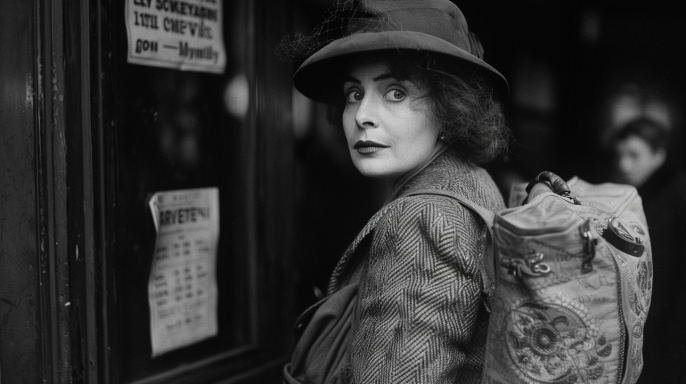In 1926, famed mystery writer Agatha Christie disappeared for 11 days, prompting a nationwide search in England. She was eventually found staying at a hotel under a different name, claiming amnesia. The reasons behind her disappearance remain a subject of speculation and intrigue. This article explores the details of Christie’s disappearance, the ensuing search, and the various theories that have emerged over the years.
Agatha Christie’s Background
Agatha Christie, born in 1890, became one of the most celebrated mystery writers of her time, creating iconic characters such as Hercule Poirot and Miss Marple. By 1926, she was already a well-established author with a growing reputation for her intricate and compelling mysteries.
The Disappearance
On December 3, 1926, Agatha Christie vanished from her home in Berkshire. Her car was found abandoned with an expired driving license and clothes inside, leading to immediate concerns for her safety. The mysterious circumstances surrounding her disappearance captured public attention and sparked widespread speculation.
Nationwide Search
The search for Christie quickly escalated into a nationwide effort, involving police, volunteers, and even fellow authors. The media frenzy amplified public interest, with daily reports and sensational headlines. Notable figures, including Sir Arthur Conan Doyle, contributed to the search, using various methods, including spiritualism.
Discovery at the Hotel
Agatha Christie was found on December 14, 1926, at the Swan Hydropathic Hotel (now the Old Swan Hotel) in Harrogate. She had checked in under the name Theresa Neele, the surname of her husband’s mistress. Christie appeared to have no recollection of her own identity or the events leading up to her disappearance.
Christie’s Explanation
Upon being found, Christie claimed to have suffered from amnesia, a condition that prevented her from recalling any details about her disappearance. While some medical professionals supported her claim, others were skeptical, suggesting alternative explanations for her behavior.
Personal Context
The period leading up to Christie’s disappearance was marked by significant personal turmoil. Her husband, Archibald Christie, had revealed an affair and requested a divorce. This emotional distress likely played a crucial role in her mental state and subsequent actions.
Theories and Speculations
Several theories have emerged about Christie’s disappearance:
- Publicity Stunt: Some suggest the disappearance was a calculated move to boost book sales, though this theory lacks substantial evidence.
- Psychological Breakdown: Many believe Christie experienced a psychological breakdown triggered by her husband’s infidelity and the pressures of her career.
- Other Theories: Various other theories, ranging from an elaborate revenge plot against her husband to a genuine case of dissociative fugue, have been proposed.
Media Coverage and Public Reaction
The media coverage of Christie’s disappearance was extensive, with newspapers providing daily updates and speculating on possible scenarios. Public reaction ranged from sympathy and concern to fascination and skepticism. The case highlighted the intense public interest in Christie’s personal life, mirroring the intrigue of her fictional mysteries.
Impact on Christie’s Career
Despite the scandal, Christie’s career continued to flourish. Her subsequent novels, including classics like “The Murder of Roger Ackroyd” and “Murder on the Orient Express,” solidified her status as a literary giant. The disappearance episode added an element of mystique to her public persona, enhancing her legacy.
Psychological Perspectives
Modern psychologists have analyzed Christie’s claim of amnesia, with some suggesting she may have experienced a dissociative fugue—a rare condition often triggered by severe stress or trauma. This explanation aligns with her reported inability to recall personal details and her adoption of a new identity.
Christie’s Later Life
After her disappearance, Christie resumed her writing career, producing numerous bestselling novels. She rarely spoke about the incident, only briefly mentioning it in her autobiography, where she provided limited insight into her mental state during those 11 days.
Literary Parallels
Themes of disappearance, identity, and psychological distress recur in Christie’s novels. Works such as “The Mystery of the Blue Train” and “Sleeping Murder” reflect elements of her own life experiences, blending fact with fiction.
Comparative Cases
Christie’s disappearance is not unique; other famous individuals have vanished and reappeared under mysterious circumstances. Comparing her case with others reveals common factors such as personal stress and public scrutiny, highlighting the broader phenomenon of high-profile disappearances.
Cultural Impact
Agatha Christie’s disappearance has left a lasting impact on popular culture, inspiring films, books, and documentaries. The incident has become a part of her legend, contributing to the enduring fascination with her life and work.
Conclusion
The mystery of Agatha Christie’s disappearance remains unresolved, blending elements of personal drama, psychological intrigue, and public fascination. While various theories offer plausible explanations, the true reasons behind her actions continue to elude definitive understanding. Christie’s legacy as a master storyteller endures, enriched by the enigma of her own life.
FAQs
What happened during Agatha Christie’s disappearance?
In December 1926, Agatha Christie vanished for 11 days and was later found at a hotel in Harrogate, claiming to suffer from amnesia.
How was Agatha Christie found?
Christie was discovered staying at the Swan Hydropathic Hotel under the name Theresa Neele, the surname of her husband’s mistress.
Did Agatha Christie ever explain her disappearance?
Christie claimed amnesia and provided limited details about the incident, which has led to ongoing speculation and various theories.
What theories exist about Agatha Christie’s disappearance?
Theories include a psychological breakdown, a possible publicity stunt, and dissociative fugue, among others.
How did the disappearance affect Agatha Christie’s career?
The incident added to her mystique and did not hinder her career; she continued to write bestselling novels and remains one of the most celebrated mystery writers of all time.

